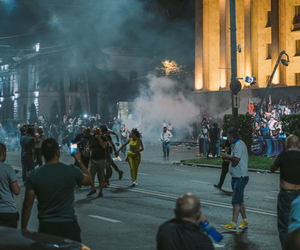The Georgian Prosecutor’s Office has begun conducting investigative actions on Rustaveli Avenue in connection with the June 20–21, 2019 protest crackdown (“Gavrilov Night”) following a ruling by the European Court of Human Rights (ECHR).
“In line with the Strasbourg Court’s decision and recommendations, we are carrying out investigative procedures with the participation of victims to ensure an effective investigation,” the Prosecutor’s Office said. The goal is to reconstruct the crime scene and identify potential perpetrators involved in the violent dispersal.
The ECHR found that Georgian authorities had violated Article 3 of the European Convention on Human Rights in its procedural aspect. The ruling concerns allegations of abuse of power with violence and weapons by Interior Ministry personnel during efforts to maintain public order during the 2019 demonstrations.
The Court ordered the Georgian state to undertake specific investigative measures, including involving victims in efforts to determine whether the Ministry of Internal Affairs planned the operation appropriately and whether there was excessive use of force.
The case is currently being handled by the Tbilisi Prosecutor’s Office Investigation Department.
Background on “Gavrilov Night”
“Gavrilov Night” refers to the events of June 20, 2019, when mass protests erupted in Tbilisi after Russian MP Sergey Gavrilov addressed the Georgian Parliament from the Speaker’s chair during an international assembly. His appearance sparked outrage due to Russia’s occupation of Georgian territories. That evening, thousands gathered on Rustaveli Avenue, demanding government accountability. The protest turned violent when police used rubber bullets and tear gas to disperse the crowd, injuring hundreds, including journalists and demonstrators. The crackdown drew widespread criticism and led to political unrest and public demands for reform.














